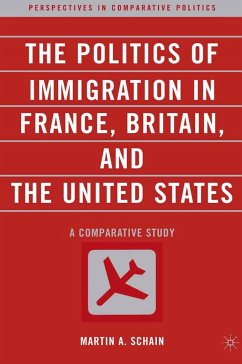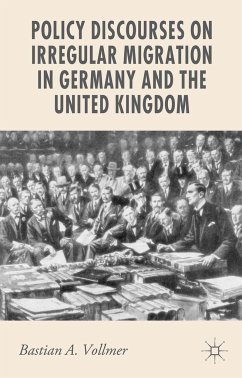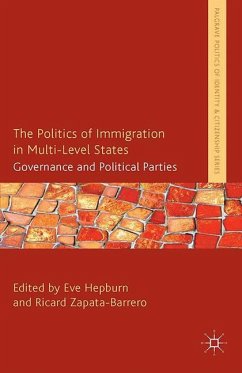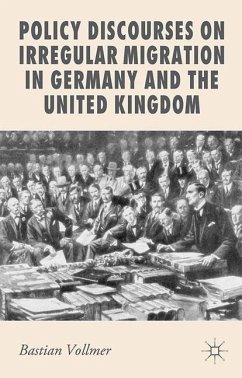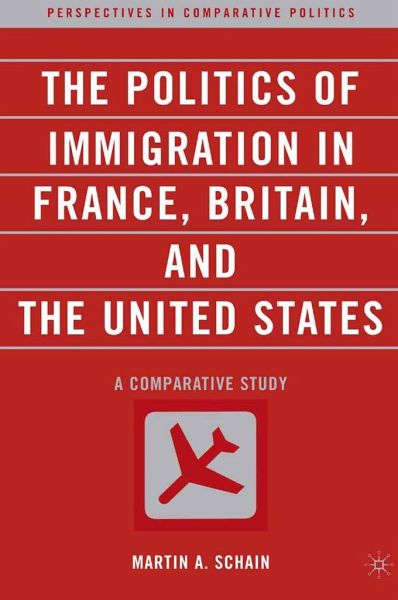
Martin A. Schain
Gebundenes Buch
The Politics of Immigration in France, Britain, and the United States
A Comparative Study
Versandkostenfrei!
Versandfertig in 6-10 Tagen
Weitere Ausgaben:

PAYBACK Punkte
19 °P sammeln!





This book argues that although labour market needs have been an important element in the development of immigration policy, they have been filtered through a political process, the politics of immigration. The book explores the relation between policy and politics in France, the UK, and the US.
MARTIN A. SCHAIN is Director of the Center for European Studies at New York University, USA. He is the editor of Palgrave's series Europe in Transition and is the author or co-author of ten books, many published by Palgrave, including The Marshall Plan: Fifty Years After and A Century of Organized Labor in France.
Produktdetails
- Perspectives in Comparative Politics
- Verlag: Palgrave Macmillan / Palgrave Macmillan US / Springer Palgrave Macmillan
- Artikelnr. des Verlages: 978-1-4039-6215-7
- 2008
- Seitenzahl: 329
- Erscheinungstermin: 12. März 2009
- Englisch
- Abmessung: 244mm x 161mm x 30mm
- Gewicht: 681g
- ISBN-13: 9781403962157
- ISBN-10: 1403962154
- Artikelnr.: 21300803
Herstellerkennzeichnung
Libri GmbH
Europaallee 1
36244 Bad Hersfeld
gpsr@libri.de
"In this study Martin Schain scrutinizes immigration politics in three major Western democracies, from a refreshingly comparative standpoint. He relates the domestic politics and immigration policies of Britain, France, and the United States, vividly showing how these nations policies towards migrants developed and changed over many decades. This volume builds upon and goes beyond previous research, revealing issues and policy dilemmas that transcend any single nation, but that are difficult to discern without Schain s incisive comparative approach." - Christopher Mitchell, Professor of Politics, New York University
"Martin Schain s book is an immense achievement. It transcends the typical (but artificial) European/North American
"Martin Schain s book is an immense achievement. It transcends the typical (but artificial) European/North American
Mehr anzeigen
divide in immigration studies; is written with great clarity and persuasiveness; and it offers an account of immigration policy that rightly rejects overly deterministic structural accounts, placing the accent squarely on politics and the political process. This book should be read as both a theoretical explanation of the politicization of immigration and as an empirical overview of immigration policy and politics in France, Britain, and the US, one that is uniquely sensitive to the particularities of each case. It is indispensable for students of immigration." - Prof. Randall Hansen, Canada Research Chair in Immigration & Governance, Department of Political Science, University of Toronto
Martin Schain's book is a tour de force that should be read by all students of immigration policy. He provides a comprehensive, thoughtful comparative analysis in explaining the historic and current differences in the politics and policies of immigration in the United States, France and Britain, focusing on the impact of institutions, the role of different actors, and the dynamics between them. Schain has done a masterly job in examining the vital immigration challenges of our age, notably the ability of the liberal states to controls their frontiers and to integrate their new migrants. Yet beyond these topical issues, this book addresses important implications for how we should understand the question of migration itself." - Ariane Chebel d'Appollonia, Associate Researcher, CEVIPOF/Center for Political Research, Sciences Po Paris
Martin Schain's book is a tour de force that should be read by all students of immigration policy. He provides a comprehensive, thoughtful comparative analysis in explaining the historic and current differences in the politics and policies of immigration in the United States, France and Britain, focusing on the impact of institutions, the role of different actors, and the dynamics between them. Schain has done a masterly job in examining the vital immigration challenges of our age, notably the ability of the liberal states to controls their frontiers and to integrate their new migrants. Yet beyond these topical issues, this book addresses important implications for how we should understand the question of migration itself." - Ariane Chebel d'Appollonia, Associate Researcher, CEVIPOF/Center for Political Research, Sciences Po Paris
Schließen
'This three-nation study by Schain (New York University) is ample proof that comparative politics is alive and well and, above all, thriving. . . It is comparative political analysis at its best. . . The result is a theoretical presentation as rewarding as the analyses of the immigration case studies, a presentation students of public policy should not miss. Summing up: highly recommended. Upper-division undergraduates and above.' - CHOICE
'The book makes an important contribution to the study of comparative immigration politics in Western countries by stressing the role of electoral politics and the politicization of the immigration issue. By exploring the framing by political actors, Schain skillfully explains how immigration
'The book makes an important contribution to the study of comparative immigration politics in Western countries by stressing the role of electoral politics and the politicization of the immigration issue. By exploring the framing by political actors, Schain skillfully explains how immigration
Mehr anzeigen
policies and politics within a given country have changed over time. Whether or not one accepts Schain's thesis regarding the centrality of electoral politics in explaining the variation in immigration policies in these three Western countries, his book offers a compelling theoretical explanation of the politicization of immigration. It draws on ample empirical support and invites intellectual engagement, even from those who might think otherwise. It is an important addition to comparative politics, and I expect that it will be widely read and referenced by students of this important topic.' - Perspectives on Politics
'In this study Martin Schain scrutinizes immigration politics in three major Western democracies, from a refreshingly comparative standpoint. He relates the domestic politics and immigration policies of Britain, France, and the United States, vividly showing how these nations' policies towards migrants developed and changed over many decades. This volume builds upon and goes beyond previous research, revealing issues and policy dilemmas that transcend any single nation, but that are difficult to discern without Schain's incisive comparative approach.' - Christopher Mitchell, Professor of Politics, New York University, USA
'Martin Schain's book is an immense achievement. It transcends the typical (but artificial) European/North American divide in immigration studies; is written with great clarity and persuasiveness; and it offers an account of immigration policy that rightly rejects overly deterministic structural accounts, placing the accent squarely on politics and the political process. This book should be read as both a theoretical explanation of the politicization of immigration and as an empirical overview of immigration policy and politics in France, Britain, and the US, one that is uniquely sensitive to the particularities of each case. It is indispensable for students of immigration.' - Prof. Randall Hansen, Canada Research Chair in Immigration & Governance, Department of Political Science, University of Toronto, Canada
'Martin Schain's book is a tour de force that should be read by all students of immigration policy. He provides a comprehensive, thoughtful comparative analysis in explaining the historic and current differences in the politics and policies of immigration in the United States, France and Britain, focusing on the impact of institutions, the role of different actors, and the dynamics between them. Schain has done a masterly job in examining the vital immigration challenges of our age, notably the ability of the liberal states to controls their frontiers and to integrate their new migrants. Yet beyond these topical issues, this book addresses important implications for how we should understand the question of migration itself.' - Ariane Chebel d'Appollonia, Associate Researcher, CEVIPOF/Center for Political Research, Sciences Po Paris
'In this study Martin Schain scrutinizes immigration politics in three major Western democracies, from a refreshingly comparative standpoint. He relates the domestic politics and immigration policies of Britain, France, and the United States, vividly showing how these nations' policies towards migrants developed and changed over many decades. This volume builds upon and goes beyond previous research, revealing issues and policy dilemmas that transcend any single nation, but that are difficult to discern without Schain's incisive comparative approach.' - Christopher Mitchell, Professor of Politics, New York University, USA
'Martin Schain's book is an immense achievement. It transcends the typical (but artificial) European/North American divide in immigration studies; is written with great clarity and persuasiveness; and it offers an account of immigration policy that rightly rejects overly deterministic structural accounts, placing the accent squarely on politics and the political process. This book should be read as both a theoretical explanation of the politicization of immigration and as an empirical overview of immigration policy and politics in France, Britain, and the US, one that is uniquely sensitive to the particularities of each case. It is indispensable for students of immigration.' - Prof. Randall Hansen, Canada Research Chair in Immigration & Governance, Department of Political Science, University of Toronto, Canada
'Martin Schain's book is a tour de force that should be read by all students of immigration policy. He provides a comprehensive, thoughtful comparative analysis in explaining the historic and current differences in the politics and policies of immigration in the United States, France and Britain, focusing on the impact of institutions, the role of different actors, and the dynamics between them. Schain has done a masterly job in examining the vital immigration challenges of our age, notably the ability of the liberal states to controls their frontiers and to integrate their new migrants. Yet beyond these topical issues, this book addresses important implications for how we should understand the question of migration itself.' - Ariane Chebel d'Appollonia, Associate Researcher, CEVIPOF/Center for Political Research, Sciences Po Paris
Schließen
Für dieses Produkt wurde noch keine Bewertung abgegeben. Wir würden uns sehr freuen, wenn du die erste Bewertung schreibst!
Eine Bewertung schreiben
Eine Bewertung schreiben
Andere Kunden interessierten sich für




